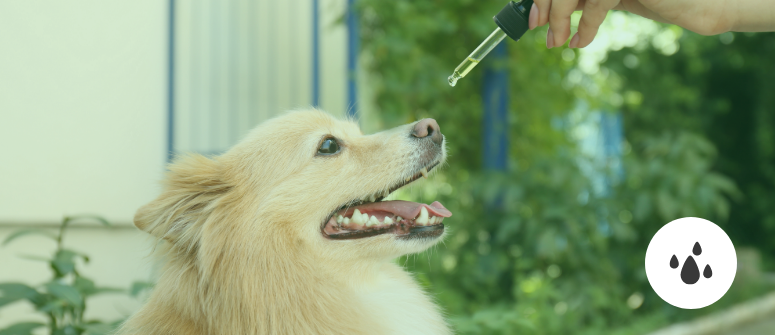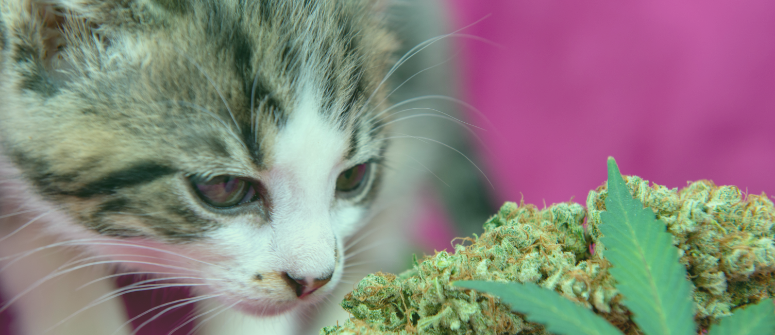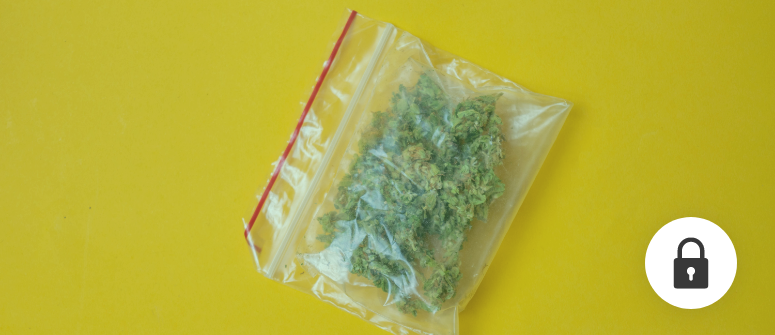Is cannabis safe for pets?

While many humans enjoy the effects of cannabis, the reality is that THC can be harmful to animals. However, there is increasing evidence that CBD and hemp oil might have some positive effects. Get acquainted with the types of cannabis products potentially suitable for pets, and learn what to do if your dog or cat accidentally consumes THC.
Contents:
While the cannabis revolution has now arrived for humans, the question remains, how safe is cannabis for your furry friend? There is an increasing segment of the cannabis industry that is, in fact, now targeting this market.
However, only a select few cannabis-derived molecules are deemed safe for dogs and cats, so choosing the right products is essential for responsible pet parents. While products containing CBD and other non-psychotropic cannabinoids are sometimes administered to animals, and in some cases even endorsed by vets, products containing THC pose a considerable risk, and are rarely, if ever, suitable for cats or dogs.
Can Cannabis Kill Your Pet?
Cannabis containing THC can affect dogs and cats extremely negatively. This is true whether they inhale secondhand smoke or eat a cannabis-laced treat. The drug enters the body and binds with specific receptors, altering normal neurotransmitter function.
Cats tend to show that they are “stoned” by being super vocal and hyperactive—similar to how they are “on” catnip. Although, catnip is considered appropriate for cats given its unique interaction with the feline body, whereas weed is not. At higher doses, cats may drool, vomit, or even exhibit tremors in severe instances.
Dogs, however, do not respond well to THC at any dose, and accidental intake can be a traumatising event for both you and your friend.
Just like humans, a lethal oral dose of THC for pets is high—but deaths have occurred after ingestion of highly concentrated THC edibles, including medical marijuana. In fact, animal and pet deaths were very rare until the development of highly potent cannabis concentrates.
However, pets can also become severely intoxicated, which can lead to severe health issues.
In general, here is the best rule to keep your pet safe: do not allow them to eat or otherwise consume any human cannabis product, especially those containing THC. If you introduce cannabinoids to your pet, do so under a vet’s supervision, and only give them specially formulated animal products that contain either no or insignificant levels of THC.
How Can Your Pet Become Intoxicated From Cannabis?

The answer to this question is simple. Pets become intoxicated by THC—either from secondhand smoke, or, more commonly, by ingesting edibles containing THC extract. CBD is another story, but it is also best to still be very careful.
Dogs have far more cannabinoid receptors than humans and metabolise cannabinoids differently. This, in turn, creates a much more profound and undesirable influence in dogs’ bodies, specifically.
This is why it is critical to be aware of the potential impact of THC poisoning on your pet—and take proactive precautions to protect them.
Cats may act differently, but it is also not a good idea to introduce THC to them either. If you want to give your cat a little feline “wacky weed”, stick to regular old catnip. And just like dogs, if you’re interested in giving your cat CBD for a particular reason, talk to your vet first, and use an animal-appropriate product.
Secondhand cannabis smoke
Pets can technically get high from your THC fumes; however, this is a rarity. In fact, in most cases, pet intoxication is the result of dogs or cats ingesting THC edibles. Inhalation of secondhand weed smoke is far less likely to get pets high, but is most likely to occur in unventilated and confined conditions.
That said, exposing them to smoke at all, of any kind, is not a good idea. Domestic pets have very sensitive respiratory systems. Any kind of smoke can irritate their lungs, causing coughing or exacerbating existing conditions such as asthma.
Eating edibles or buds
Unlike humans, pets can become intoxicated from ingesting raw (aka not decarboxylated) buds from the cannabis plant. In these cases, symptoms tend to be relatively mild, depending on several factors. If they happen to eat an edible with THC concentrate in it, however, the severity of this effect is likely to be much greater.
In particular, the size of the pet and the amount ingested play the largest role in how an animal reacts to THC.
If you suspect that your cat or dog has ingested cannabis, take them immediately to the vet. Once there, the vet may induce vomiting or pump the animal’s stomach. However, in many cases of THC toxicity, this does not help, as the cannabinoids have already been absorbed by the pet’s body.
Pets may also receive activated charcoal (as a fluid). This will help to neutralise anything left in the stomach and intestines. Some vets may use an enema to reduce THC absorption in the GI tract. Supportive care is also mandatory when your dog is recovering from cannabis poisoning.
So far, the consensus from veterinarians is that marijuana is dangerous to pets, particularly dogs. With that in mind, if you partake in the herb, treat pets like kids, and keep your stash far away from them in a child and pet-proof container.
What About Hemp-Derived Products?

The hemp plant is a different “animal” when it comes to its effect on dogs and cats. Indeed, researchers are eager to determine if hemp and CBD oil can be beneficial for pets. Hemp seed oil is just a nutrient-rich oil extracted from the seeds of the hemp plant, and actually contains no active cannabinoids. CBD oil, on the other hand, is most often harnessed from hemp flowers and leaves. This cannabinoid is now featured in a wide range of wellness products aimed at pets. But that doesn’t mean CBD is suitable to administer your cat or dog without guidance.
The reality is that this entire area needs more study.
That said, alternative and holistic vets are starting to suggest that CBD products made specifically for animals might be a viable natural alternative—just like for humans. This includes both ingestible and topical treatments.
How To Know If Your Dog Or Cat Is Intoxicated From Cannabis
Animals exhibit many of the same signs as people when they become intoxicated by THC. They can become uncoordinated and shaky on their feet; they can appear disoriented and very vocal. Their pupils will dilate, creating a wild-eyed appearance, and they might drool, vomit, or develop urinary incontinence. In the worst cases, they can develop seizures and enter a coma.
Diagnosis at the vet’s office will be based on an accurate history (fessing up) and clinical signs. These include elevated or low heart rate and blood pressure. Respiration can also be significantly slowed. These side effects are usually not long-lasting, but they can be dangerous. They will certainly make your pet miserable.
What To Do If Your Pet Has Been In Contact With Cannabis

There are several things to do immediately if you suspect your pet has consumed THC.
The first thing to do is call either your vet or an animal poison control hotline. In the United States and Canada, pet poison hotlines exist, where people are trained to deal specifically with accidental ingestion of cannabinoids. Outside of North America, the best thing to do is call your vet, or their emergency care line if out of hours.
Cannabis consumption can be deadly, especially considering the other ingredients in certain edibles. For example, cannabis chocolates or brownies are doubly dangerous for dogs. Candies containing both THC and the sweetener xylitol can also produce double trouble for pets who consume them.
As mentioned, vets will treat the poisoning using one or more of a variety of methods, which include everything from pumping the stomach to administering IV fluids.
How To Minimise The Risks Of Cannabis For Your Pet

There are several common-sense ways to keep your stash safe from your pet. After all, the experience of your pet ingesting your cannabis or cannabis treats is going to be unpleasant for both of you—not only due to worry and expensive vet bills, but the loss of your weed too.
The best way to prevent this kind of accident is to treat animals like children when it comes to cannabis. Keep your weed safely secured in a tight container (which is the best way to maintain quality anyway). Put this container in a place where your pets cannot get to it. This is particularly important when it comes to dog and cat households.
Cats in particular are drawn to the smell of cannabis (which is much like catnip to them). They will not only go hunting for it, but will knock containers to the floor in an attempt to get the contents out of it. If you have a special drawer or secured space for your stash, this is the safest strategy.
Beyond storage, it is also best to consume marijuana away from your pets. To animals, that sweet or savoury treat is tempting all on its own. If you are smoking, be sure to at least have good ventilation and an open window so the animal has little chance of getting exposed to any smoke.
Finally, if you're growing your own cannabis plants at home, be sure to situate your specimens in an area where your cat or dog can't get to it. This will save both of you some heartache.
All in all, pet owners can feel free to enjoy the cannabis plant, so long as they take the few, necessary precautions to maintain the health and safety of their beloved friends.
.jpg)
.jpg)

.jpg)
